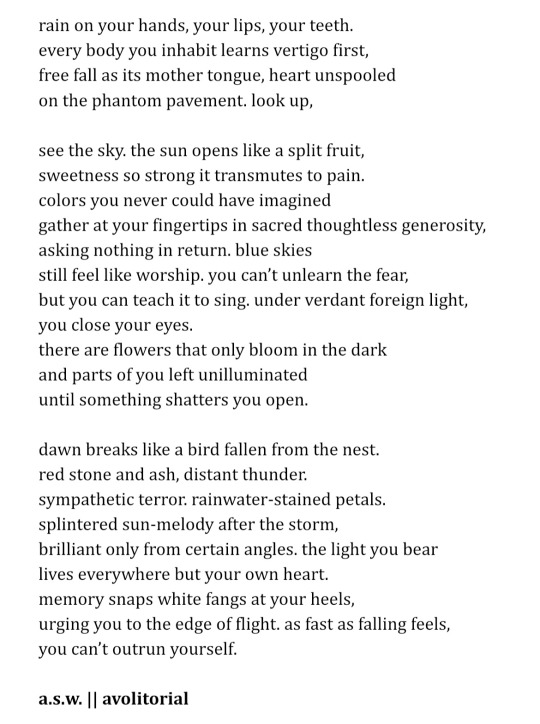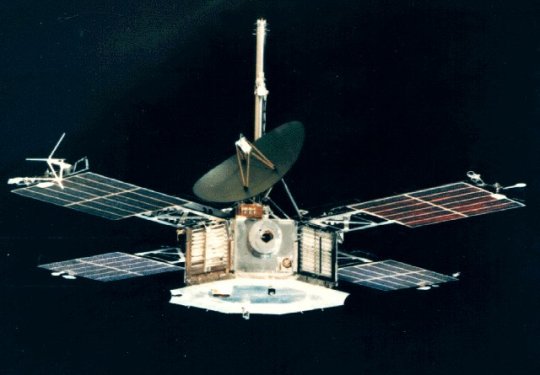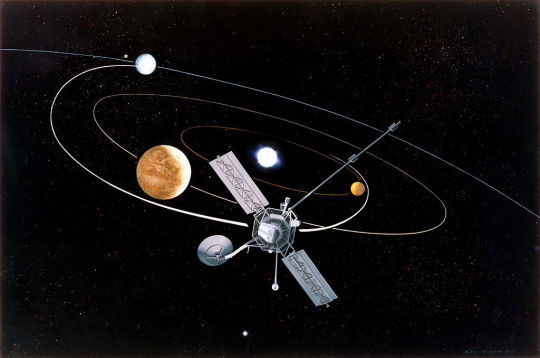#the distance between experience and its representation
Text

(ID in alt text)
#spilled ink#poets on tumblr#original poetry#c: made a bowerbird of me#the distance between experience and its representation#*appears after several months of radio silence to post an incomprehensible dndpoem* no yeah this is fully on brand#hi. i’m not dead.
160 notes
·
View notes
Text
a richard siken poem is my first assignment in my creative writing class someone help
#WHO GETS TO MEASURE THE DISTANCE BETWEEN EXPERIENCE AND ITS REPRESENTATION?#WHO CONTROLS THE LINES OF INQUIRY? WE DO. ANYWONE CAN.#🫧🪴
10 notes
·
View notes
Text
#not going by distance i think time is a better representation of vibe#im juuuust under an hour and i see people wi lobster traps in their yard and buoys on their barn and i'm like hm..really? lol#its nice to see but i think its a stretch#we're between the mountain area and the beach area in my mind but lean more towards mountains#i wish the beach was closer but thats my literal only regret abt where we live lol#if i was a better more confident driver i might not mond at all tbh#anyway#when i lived 4 hours away people acted like it was a beachy area but....it was not#if you need to stay in a hotel to visit it doesnt count to me#like its not kansas but come on....#just bc your state has a beqch does not make every area in that state coastal#coastal decor is corny unless you're close to the beach#nobody cares about this issue but i need to know the consensus#maybe im just biased bc i grew up in a more coastal area than i live now but maybe my area still counts#i would like to think so but im not convinced#i think 30-45 min has to be the limit#but maybe my experiences are not universal here#this has been a shitpost
7 notes
·
View notes
Text
ok. years have passed and we've had some distance, so i'm finally gonna take the leap of faith that tma fandom is finally ready to hear me on this. let's talk about tannins.
161 was the first tma episode i heard on early release, and i felt the bit where martin declines wine and cites tannins was pretty obvious in its implications. cool, got it, say no more.
imagine my surprise when i was one of maybe three people i saw read between the lines there, in a fandom famous for red stringing--a fandom that immediately caught the much less obvious thread of ignition sources in the same episode. i'll spell it out: alcohol is an issue for martin.
maybe it just felt obvious because addiction is a pet issue for me--as it is for jonny, who has said everything he writes is filtered through a lens of addiction. i don't know if that's due to his own experience or a loved one's, and i won't speculate; i also don't know if martin personally struggled with drinking or just avoids it for fear he would, but alcohol would fit what we know of his family. his dad walking out and his mum spiralling into bitter wallowing and verbal abuse? i'd bet one or both of them drank, yeah.
on a basic level martin tries to decline alcohol, and that alone should have raised eyebrows given what we know of martin and, again, a fandom that dissects everything. we already knew martin "K" blackwood lied about his personal life and his family in particular, especially pre-canon, which is when this flashback took place. i was shocked that everyone took his flimsy excuse at face value with no further questions.
and the excuse is flimsy. martin turns down wine by--nervously--exclaiming tannins are "a proven headache trigger!" which sounds like trivia from a magazine cover and not the words of someone who actually has headaches--and it hasn't come up before or since. jon, confused, points out that tea, a drink martin consumes to a degree that is memetic both in- and out-of-universe, also contains tannins, and martin squawks a panicked, "what?!"
if tannins are enough of a concern for martin that he knew they're in wine and so avoids it, why didn't he know they're in his drink of choice? why does he still drink tea at the time of canon, and why doesn't he struggle with constant headaches from consuming 'a proven headache trigger' day in and day out? why, indeed, would someone avoid wine and not tea?
when sasha insists martin drink he caves and agrees to 'just a drop'. i imagine him pouring it in a plant, which admittedly he could have done if tannins really were the issue. i will say that i, for one, would be less likely to falsely agree to something that makes me physically ill than to a private issue that i'd rather not be pressed on any further. this scene also establishes martin's birthday was an ice cream party instead of the more traditional visit to a pub.
also, this scene was in the first episode of the final season, as one of three flashbacks that could have been to any pre-canon event in the archives. prime narrative real estate. not really time one would waste on establishing the important character context that martin has... headaches. which never comes up before or after, even regarding the week he spent in spiral town. but you know what is pretty crucial character background...?
it felt like a no-brainer, and yet all i saw was h/c fluff about jon attending to martin's headaches. and i hate feeling bitter about disability representation. i want folks with chronic headaches to feel seen and have fluffy escapist fantasies. i don't want to be mad about people portraying a character with a disability. but, guys? you got the wrong disability. jonny sent a clear message, and it went over fandom's head.
#martin blackwood#tma#the magnus archives#tma meta#the magnus archives meta#tma 161#mag161#sage speaks#sage original post#meta#im sure others caught it that i didnt see but listen. i was DEEP in the fandom. people getting it made up maybe 1% of the response i saw#and i had people fighting me for saying it#alcohol cw#alcoholism cw#addiction cw#greatest hits#wonderful news: tma fandom WAS ready to hear me say this!
1K notes
·
View notes
Text
Mariner program
The Mariner program was conducted by the American space agency NASA to explore other planets. Between 1962 and late 1973, NASA's Jet Propulsion Laboratory (JPL) designed and built 10 robotic interplanetary probes named Mariner to explore the inner Solar System - visiting the planets Venus, Mars and Mercury for the first time, and returning to Venus and Mars for additional close observations.

The program included a number of interplanetary firsts, including the first planetary flyby, the planetary orbiter, and the first gravity assist maneuver. Of the 10 vehicles in the Mariner series, seven were successful, forming the starting point for many subsequent NASA/JPL space probe programs.

The name of the Mariner program was decided in "May 1960-at the suggestion of Edgar M. Cortright" to have the "planetary mission probes ... patterned after nautical terms, to convey 'the impression of travel to great distances and remote lands.'" That "decision was the basis for naming Mariner, Ranger, Surveyor, and Viking probes."

Each spacecraft was to carry solar panels that would be pointed toward the Sun and a dish antenna that would be pointed at Earth. Each would also carry a host of scientific instruments. Some of the instruments, such as cameras, would need to be pointed at the target body it was studying. Other instruments were non-directional and studied phenomena such as magnetic fields and charged particles. JPL engineers proposed to make the Mariners "three-axis-stabilized," meaning that unlike other space probes they would not spin.

Mariner 1 and Mariner 2
Mariner 1 and Mariner 2 were two deep-space probes making up NASA's Mariner-R project. The primary goal of the project was to develop and launch two spacecraft sequentially to the near vicinity of Venus, receive communications from the spacecraft and to perform radiometric temperature measurements of the planet. A secondary objective was to make interplanetary magnetic field and/or particle measurements on the way to, and in the vicinity of, Venus.

Animation of Mariner 2's trajectory from August 27, 1962, to December 31, 1962. Mariner 2 · Venus · Earth.
Mariners 3 and 4
Sisterships Mariner 3 and Mariner 4 were Mars flyby missions.
Mariner 3 was launched on November 5, 1964, but the shroud encasing the spacecraft atop its rocket failed to open properly and Mariner 3 did not get to Mars.
Mariner 4, launched on November 28, 1964, was the first successful flyby of the planet Mars and gave the first glimpse of Mars at close range

This archival image is an enhanced contrast version of the first Mars photograph released on July 15, 1965. This is man's first close-up photograph of another planet -- a photographic representation of digital data radioed from Mars by the Mariner 4 spacecraft. Data was either sent to Earth immediately for acquisition or stored on an onboard tape recorder for later transmission.

The pictures, played back from a small tape recorder over a long period, showed lunar-type impact craters (just beginning to be photographed at close range from the Moon), some of them touched with frost in the chill Martian evening.
Mariner 5

The Mariner 5 spacecraft was launched to Venus on June 14, 1967, and arrived in the vicinity of the planet in October 1967. It carried a complement of experiments to probe Venus' atmosphere with radio waves, scan its brightness in ultraviolet light, and sample the solar particles and magnetic field fluctuations above the planet.
Mariners 6 and 7

Mariners 6 and 7 were identical teammates in a two-spacecraft mission to Mars. Mariner 6 was launched on February 24, 1969, followed by Mariner 7 on March 21, 1969. They flew over the equator and southern hemisphere of the planet Mars.
Mariners 8 and 9

Mariner 8 and Mariner 9 were identical sister craft designed to map the Martian surface simultaneously, but Mariner 8 was lost in a launch vehicle failure. Mariner 9 was launched in May 1971 and became the first artificial satellite of Mars.
Mariner 10

The Mariner 10 spacecraft launched on November 3, 1973, and was the first to use a gravity assist trajectory, accelerating as it entered the gravitational influence of Venus, then being flung by the planet's gravity onto a slightly different course to reach Mercury. It was also the first spacecraft to encounter two planets at close range, and for 33 years the only spacecraft to photograph Mercury in closeup.

Venus in real colors, processed from clear and blue filtered Mariner 10 images

Mariner 10's photograph of Venus in ultraviolet light (photo color-enhanced to simulate Venus's natural color as the human eye would see it)

This mosaic shows the planet Mercury as seen by Mariner 10 as it sped away from the planet on March 29, 1974.
source x, x | images x
#mercurio#mercury#venus#mars#marte#astronomy#astronomia#space#solarsystem#sistemasolar#universe#universo#mariner#mission#space exploration
250 notes
·
View notes
Note
🏳️🌈
(Drop a 🏳️🌈 in my inbox and I’ll respond with a queer media recommendation!)
It's not currently the season for it, but I'm gonna recommend a holiday-themed erotica anyway. Eight Kinky Nights by Xan West z”l is a Chanukah-themed f/f BDSM romance between a 51-year-old gray ace femme submissive named Leah, and a newly-divorced 49-year-old stone butch dom named Jordan.

Here's the official plot summary:
Sometimes the perfect Chanukah gift can change everything.
Newly divorced stone butch Jordan moves into her friend Leah’s spare room, ready, at 49, to take on a new job and finally explore kink and polyamory. But moving to NYC during the holidays sends grief crashing through her, and Jordan realizes that when she isn’t solely focused on caring for others, her own feelings are unavoidable. Including her feelings for Leah.
51 year old queer femme Leah, an experienced submissive kink educator who owns a sex shop, has recently come to terms with being gray ace and is trying to rework her life and relationships to honor that.
Leah has a brainstorm to help them both: she offers Jordan eight kink lessons, one for each night of Chanukah, to help Jordan find her feet as a novice dominant, and to create a structured space where Leah can work on more deeply honoring her own consent, now that she knows she’s gray ace.
She’d planned to keep it casual, but instead the experience opens cracks in the armor Leah’s been using to keep people at a distance and keep herself safe. Now she needs to grapple with the trauma that’s been impacting her life for years.
Can these two autistic queers find ways to cope with the changes they are making in their lives and support each other, as they build something new they hadn’t thought was possible?
This kinky polyamorous Chanukah f/f romance includes a friends to lovers, roommates to lovers, kink lessons, seasoned romance and getting your groove back tropes, and polyamorous, gray ace, pansexual, Jewish, fat, autistic, disabled, arthritis, PTSD and depression representation.
I adore this book. I was actually a sensitivity reader for this one, helping give feedback on the aspec representation. I'm mentioned in the acknowledgments and am so, so happy to have gotten my hands on a paperback copy. I miss Xan dearly. Their Twitter account is forever marked as "on hiatus," and when we lost them, we lost the best damn kink-positive writer I've ever met. May their memory be a blessing, and may their writing find its way to everyone who needs it. <3
Ask For a Rec | Other Media Recommendations | Support Links
67 notes
·
View notes
Text

The Chrysler Building's significance extends beyond its status as an architectural masterpiece. It has woven itself into the very fabric of New York City, becoming an emblem of the city's resilience, ambition, and unwavering commitment to progress. In the midst of the Great Depression, the Chrysler Building emerged as a symbol of hope, a tangible representation of the city's determination to rise above adversity. It became a testament to the indomitable spirit of both its creators and the people of New York.
Throughout its storied history, the Chrysler Building has been a guiding light for New Yorkers and visitors alike. Its spire, which once served as a prominent beacon for aviators, now symbolizes a guiding star for those navigating the bustling streets and bustling ambitions of the city below. Whether viewed from a distance or experienced up close, the Chrysler Building's allure is magnetic, drawing the eyes and hearts of all who encounter it.
As Manhattan's skyline continues to evolve, the Chrysler Building stands as a reminder of the city's architectural heritage. While it may no longer hold the title of the tallest building in New York, its timeless elegance and unique design continue to inspire architects and developers to push the boundaries of innovation. The Chrysler Building serves as a bridge between the past and the future, showcasing the enduring beauty of Art Deco while encouraging new visions of urban design.
In the fast-paced world of the 21st century, the Chrysler Building remains a living work of art. It invites us to slow down, look up, and appreciate the craftsmanship and artistry that went into its creation. Its lobby, with its richly detailed murals and intricate design elements, is a testament to the dedication of those who built it. The building itself is a canvas upon which history, culture, and human ingenuity have been painted.
For those fortunate enough to visit New York City, a trip to the Chrysler Building is a must. While the interior may not be as accessible as its exterior, the opportunity to stand in the shadow of this architectural marvel and take in its breathtaking design is an experience like no other. The Chrysler Building is a living testament to the power of architecture to inspire and uplift the human spirit.
In the ever-changing landscape of New York City, the Chrysler Building stands as an enduring symbol of beauty, aspiration, and the relentless pursuit of excellence. It has the rare ability to grab the attention of anyone who encounters it, whether in person or through the pages of history. As a shimmering icon of Art Deco elegance, the Chrysler Building will continue to enchant, inspire, and remind us of the limitless possibilities that can be achieved when vision, determination, and creativity come together in perfect harmony. In the midst of the city's ceaseless energy and ambition, the Chrysler Building remains an exquisite reminder of the enduring magic of New York.
<Previous page - Chrysler Building - Next page>
#Chrysler Building#new york city#new york#new-york#newyork#nyc#ny#manhattan#urban#city#usa#United States#buildings#travel#journey#outdoors#street#architecture#visit-new-york.tumblr.com
221 notes
·
View notes
Note
Am I the asshole for relating to a robot?
This is a situation that too place between me (NB 27) and my friend Charlie (NB 23). Charlie has diagnosed autism, I am currently working on getting a diagnosis/help for something in the autism/ADHD/OCD family.
I really enjoy reading science fiction books, and I recently picked up one based on the fact that it was supposed to have aroace representation. The main character is a robot (maybe a cyborg? it has organic parts) who does have aroace internal commentary. But it also has a lot of internal commentary that could be viewed as autistic coded. Things like being uncomfortable when its face is visible to humans, or finding conversations about feelings awkward. There’s more, but that’s the general gist.
I mentioned to Charlie how much I liked the book and the main character. How much it felt like me. And Charlie got upset because any form of a robot or non-human entity being seen as autistic is offensive and shouldn’t be read. And I get in the wider scope how it’s frustrating if that is the only representation, but I don’t think identifying with it personally is an issue. I prefer stories where there is some distance between me and the character like that. (As in, I don’t like reading about someone struggling with my exact situation, if that makes sense)
If it counts for anything, the author has said that they didn’t set out to make the robot autistic, just that they drew on their own life experiences with social anxieties and such.
What are these acronyms?
153 notes
·
View notes
Note
Saw ur also a ???% fan… 👀
Care to share your thoughts around him? Or headcanons if you have them? :D
1. You just noticed? I have NOT been talking enough about him then. I will rectify this immediately. (This is a joke you're good)
2. SO.
These will be scattered. Because I am a very scattered person.
I will flip flop between if I like the disconnect between ???% and Mob better as a plural thing or an allegory .I like both! Both is good! He's so fascinating as an allegory but also he's the most accurate representation of being plural I've ever seen and it's not even canon. So like. Two cakes!
I will always be insane about the manga version of confession arc. Hold on I need to talk about this in detail or I'll actually die.
His fucking. His fucking talk with Mob. "And you were never...never...looking at me." WHAT IF I SCREAM. Literally everything he says to Mob is so interesting and also relatable as shit whether you view it as plural or as an allegory. Both is good. Like you can view him telling Mob he forgot to protect himself and all that shit as like "You only do these good things to ease your own guilt. You don't actually want to be around people. You're selfish. This is who I am. I want to be able to exist without trying to be normal. I want to be able to be seen and not be harmed for it. I am tired of everyone ignoring this part of me because they prefer you. Would they actually do what I've done for them, or are they using me?" Like. Holy shit. It's so so fucking OW especially as an autistic person. But also as a system it's so easy to read him going "You pushed all the memories you didn't want onto me. You let me handle the things you didn't want. You shoved everything onto me, and I took it with stride because I loved you. You let me take all the hard things so you didn't have to face them, because you're a coward. This is my body too. This is my life too. Why don't I get to have that? Why do I have to give it up because you don't want me? They're my family too. You don't get to decide I don't deserve to exist because you hate yourself too much to admit I'm here." Like. Its so easy to read it as him being a protector who is SO fucking resentful of all the shit he's had to deal with, all the memories he has to hold alone, all of the shit he's experienced, and not a sliver of gratitude. Like goddamn does it remind me of my experience being a system. Either way the distance from him and the relationship between him and Mob has been my favorite part of the show since I started watching. And the manga is even more interesting and it's so!!!!!!!!!!!
More confession manga thoughts!! Him saying "Ritsu is my little brother. He was calling me Nii-san." Is so. He said that when Mob asked who he was. He viewed that as a solid part of his identity. RITSU is a massive part of his identity. Does he view Mob as not Ritsu's brother then? Does he feel like he was cheated out of his own family? I wouldn't be surprised nor would I blame him for feeling like that.
And even more confession arc shit. Hi. Thinks about how ???% in the anime at least had to steel himself before raising his hand at Reigen. He hates him but he still cares about him. He hates him but that guy raised him as much as his parents did. Clawing at the walls.
Actually y'know what I haven't talked about my thoughts on Reigen and ???% with anyone but the friend that I watched the show with and that is a tragedy that will not stand. ???% hates Reigen so so much but also cares SO much about him. Thinks about he passed out the second Reigen told him his parents were fine, and contrast that to him saying that he can't listen to Reigen in confession. He knows that if he listens to Reigen he'll believe him and that fucking terrifies him. He'll follow after Reigen because he means the world to him, because that man raised him, because he just wants him to be proud of him so fucking badly. He'll go back to being miserable and trapped, and everyone will go back to pretending he doesn't exist. He's terrified of Reigen, I think, because he knows Reigen is a good liar. Reigen can make him believe things. And he doesn't like that. He doesn't like how gullible he actually is. That's why he doesn't trust anyone- he's gullible enough to believe anything, so he has to distrust ANYTHING, no matter how much sense it makes, because he knows he can't trust his own judgement. He's been tricked before. He'll be tricked again. Don't trust anyone. Don't trust anything you see. This is another thing that works with either autism or plurality. The autism trauma of being lied to and deceived as "jokes" constantly turning you into a trust issue riddled mess that doesn't trust your own judgement or view of people, or a traumatized protector who FORMED to help you deal with people taking advantage of you and now distrusts everyone you love because "it happened before, it'll happen again, i wont let it happen." Or both!
God. I just LOVE ???% y'all don't understand. He's everything to me. Please god read the manga. I don't know if the translation I read was completely accurate, but I love the manga and anime both so so much. ???% is my favorite character as anyone who knows me can tell you and I will never shut up about him. My GUY
#mp100#mp100 spoilers#shigeo kageyama#kageyama shigeo#plural mob#confession arc tag#candyskiez asks#candy meta
36 notes
·
View notes
Text
Heroic AU(Villainous) x experienced reader
(You can see who's my favourite reader)
It was just a normal day, working and doing whatever your boss commanded you, at the moment you were supervising an invention Flug was developing. The purpose of the machine was to travel quickly and effectively between dimensions and long distances. It was an invention destined to help the crew in the missions against heroes, but of course there was no way you would have a normal Tuesday
So, when Flug activated the machine to start to record the fails and what to repeat and your dear dementia had to jump right behind you, catching you off guard. That action made you jump nearer the machine and OH THE CHANCES!!, the invention worked in its first try, transporting you to god know where.
Well you were about to discover it very soon...
You spawned in a carbon copy of the mansion you lived in, your bosses home. Instead of the other manor, this place was way brighter, with more tones on blue, white and gold, almost heavenly-like. You were already suspecting where you were but the presence of your bosses white counterpart confirmed your suspicions:
WHITE HAT 🎩🤍:

You have met white hat before, in your third year in BH organizations.
The encounter occured because you were going to give your boss the reports of the platinum clients of the organization but the moment you entered the office you saw a literal copy of you boss but in white.
Recreation of how the scene went (I'm using my oc as representation of reader):


Yeah so basically it was kinda of a shock to you to see your boss multiplied, later on, you realised that the carbon copy of you boss (who you got to know as white hat), was way kinder and softer than his dark twin.
So when he saw you again in his manor you were both kinda shocked. 😮🫢🫥
Seeing your confusion White hat offered you his hand to help you to get up from the floor and actually seemed happy to see you.
He acted like he was greeting an old friend, very happy and smiley 😁.
You were kind of confused because even if in your first encounter you got along well with him, it had been some years now and here he was, asking you how's work and how's his brother.
You explained your situation to him, that your coworkers experiment had gone wrong and that you didn't know how to get back. He offered you to stay in the manor until his scientist could make ANOTHER dimension-traveling machine to get you back home.
He took upon himself to take you to a tour throughout all of the manor and to introduce you to his hero organization and crew and how wonderful was helping others (blah blah blah).
Since you didn't want to stay still, doing nothing, you proposed if you could supervise his scientist in the process of trying to get you home or at least do something to entertain yourself. Instead he proposed that you worked for him in the time you were stuck there.
With not many options you agreed and even if you could not do certain things (swearing, doing nefarious deeds, trying to sabotage other heroes, trying to encourage vandalism, making obviously rigged bets, etc.) you still had fun in your own way though.
I mean, you didn't exactly suffer in your time there. White hat was waaay more relaxed than your boss and the breaks were longer, and of course all of the atmosphere was sweeter.
He constantly passed by where you were working to ask you how were you doing, if you liked it there, if you would want to change to the good side he will be trying to make you good until you have to go. Obviously he fails miserably.
You had to admit even though you were a little uncomfortable at times you made not so innocent jokes and comments which horrify Clementina and White hat. You had fun there and it was nice to have a little change, and of course you got to know you bosses counterpart better. He is more open and more willing to talk with others about absolutely anything.
Since you're evil and all of that, some of your old routines were still stuck to you, and of course White had tried correcting you in any way possible, for example:
When White hat sent you to a cultural center to socialise and to try and make you be good. (He received multiple calls from the supervisors calling out you're habit of lying to the personal and how you urge others to join your criminal conducts)
WH: how was your day, reader?
Reader: fine, it was antibullying week.
WH: And you know what that means right 😃
Reader: Yeah, that I cannot bully anyone for a week :(
Wh:🫥
You eventually complied in some things like not swearing infront of Clementia, not insulting clients, apologising to the cultural center stuff... He's told you he's proud of you, but every time you keep quiet and refrain from insulting someone you feel like your swallowing poison
Eventually when you had to go WH even hugged you as a goodbye. You were a but stiff, not really used to hugs, but at lest you pated him in the back to reciprocate so there's that.
DR SLUG⚗️:

Probably the one you get along with the most, because you're both arguably the most evil ones in the house.
When his boss entered his lab with you next to him he though you were a client but then when the situation was explained, he felt a little bit of pity for you, I mean he also tends to evilness so when you were stuck there, surrounded by good and rainbows and puppies and sunshine you're like a fish out of the water🐟
When YOU first saw him you though he was the illegitimate child of BH and Dr Flug, he had the horrible mood of your boss and the bag of flug so what else was there to think?:

When you suggested the supervision of the machine he was esceptic at first, he didn't like people invading his space. After sometime, he realised that he had to make you some questions so he could develop said machine.
So basically a part of your day consisted in remembering Flugs invention structure and all of its components so you could guide Slug.
From time to time you would make some fun as hell questionable jokes and the only one laughing at them was Slug (he genuinely found them funny), he was kind of your "safe space" so you hung out with him more than with the others, he was more tolerant of you antics.
Once you developed more trust with each other, he started showing you his previous works. Blue prints of evil inventions, not so legal weapons, suspicious embalded bodies...
You noted down every single one of his ideas, you really believe he is wasting his talent. But since he has a contract and the other option is jail, there's nothing you can do about it.
Since you had nothing to do and you were bored as hell, you started to help him with paperwork, checking over some machinery, passing chemicals. Basically now you're the lab assitant.
You asked him if he could make you a copy of his blue prints so when you get back home you can put all of his intelligence on a good use. He denied it at first but after some convincing, he reconsidered it and got to the conclusion that he wasn't the one using them so it wasn't really his problem, also you were right about your argument: "he will be helping you, and helping is good, right?"(you found the loophole)
Still he only gave you some of them, but yeah, he appreciates that someone can understand and cherish his work. He feels understood.
So yeah basically you're somehow friends, those types of friends who barely talk and are both weirdos, insult each other playfully...
Really weird friends but friends after all, your interactions look like this:
Reader: let's tell eachother secrets about ourselves. I'm gonna go first. I hate you
Slug: I thought we were telling each other secrets
Hell he even started participating in your conversations more actively making sarcastic comments as an answer to you own.
Oh and of course he had fun watching you being reprimanded by WH because you just couldn't contain yourself from being your villainous self.
Your goodbye from him was a firm hand shake and a generous: "you were not so bad". Which is the nearest thing he has done to express respect or affection towards someone.
When you got back to your home he started developing a device that permits to message and call someone from other dimension. Since you gave him your number, it would be a shame to waste it.
CLEMENCIA☁️🌈:

It was kind of a shock to you because even though everyone here was inverted, you still expected her to be somewhat chaotic but she was really tranquil and chill and lovable.
When she hugged you as a greeting you almost choked in her long wavy hair, it was like drowning in a cloud of cotton candy.
She's not used to curse words since Slug was banned from saying them, so when you started swearing like a sailor she was really shocked:

At first you didn't got along, mainly because she was a little afraid of you. Once you had more interactions with eachother, she started to warm up to you really quickly.
She wanted to play with you, you seemed more willing to play with her than Slug and you weren't as rude as him (you contain yourself because she reminds you of 505).
She cook, and let me tell you: LET HER COOK. This girl does magic in the kitchen, pastries are her speciality. You have tried her cakes, cookies, milkshakes, pancakes... It's like tasting heaven, it's so good.
You don't ask her if she can make you some sweets but whenever she makes one, your the first in line to try them. 🍰😉
You both play Mario kart on her Nintendo and this girl is so good at it that almost every time you play, her victory is almost assured.
She has tried so many hairstyles on your hair, she thinks it's horrible that you barely take care about yourselve, you explained to her that you job is so demanding you barely have time to comb your hair properly.
One day Clem sat you down and started brushing and combing your hair, putting some accessories into it and all of that stuff. You've never felt it fluffier, plus, it smelled great so your not complaining.
She adores having another girl at the manor, she's so happy to have you there to have girl nights and girl talks 💕🦜
Clem is without doubt the one you tolerate the most whenever she pranks you (always light hearted or happy ending jokes) or when she gets to exited and hugs you. Normally you would comment something on whoever did you this, or just turn them away but with her you only laugh sarcastically or just give her a relaxed expression.
Really, with her you start to learn how to take care of yourselve properly. 😊☺️
She LOVES HUGS, she's always hugging you, and you don't really mind it. Much like your Dementia, she's very physical and likes to give physical touch, only that instead of punches, she gives kisses and hugs.
You once decided to put her a horror movie on one of your slumber parties (obvious request of Clem) and she ended up so afraid you had to stay the night hugging her and reassuring her that the possibilities of a puppet gaining life and going on a killing spree are non existent.
Have I told you she smells like candy? 🍭
Just as white hat, she tries to make you good or at least less bad. She doesn't go to the extreme of making you go to rehabilitation but still tries in her own way:
Clem: You know, reader, when you generalize, you tell general lies
Reader:....
Reader: Are you trying to tech me moral lessons through puns?
Clem:... Is it working? 🤗
This girl was legit crying when you had to go back to where you came from, she hugged you for a good minute and even needed Slug to pull her away from you. You really have grown to estimate her so you let her hug you as much as she wanted.
She gave you all of her social media, her email and her phone number so you could call her or message her.
After your departure, she will be pushing Slug to be quick and invent something so they can contact you. (If she ever does get to do so you guys will have video chats for hours at night 🌚🥰)
606🐻👿:

Your interactions with 606 are really restricted because he's kinda of antisocial and you are also not all that exited to interact with others.
So really normally your combos consist on you nodding you head as a greeting and him growling.
Sometimes Clementia drags him to play with her and that means dragging also you, thats how 606 ally's himself with you to try and make Clem be chiller about her games or at least to convince her to relax.
That way you managed to have calm interactions with the bear, being silent, eachother focusing yourself's with your own activities.
So basically there's not much on say about him, he really doesn't stand anyone, he's even unwilling to spend to much time with his creator.
He stands you, you stand him. You can both just exist and not do much.
Has started to help you reach higher things, like food from cabinets for example, he also does that with slug and sometimes with Clementia, is his way of expressing appreciation.
He didn't do much when you parted ways, he just growled and you just assumed that's his goodbye.
----------------------------------------------------------
Once you managed to go back to your own dimension your bitchy dearest boss, was waiting for you, the moment you set foot in the office he started shouting how dare you leave your workplace without consultation and where the hell had you been. Basically your not getting holidays any time soon.
You told him of your encounter and gave him the projects of Slug, which at lest let you free yourself's from his rage.
Now way calmer than before he just told you to go back to work and stop finding ways of loosing his time.
6 notes
·
View notes
Text
Love in the Big City: Reflections on Part 1
For context, this is the first time I am reading this story and I haven’t proceeded beyond the first part yet. I’m sure I’ll revisit these ideas once I’ve read the entire book.
As I finished Part 1 of Love in the Big City, a few strains of thought stood out for me. This got long so I'm putting it under the break.
First, the sarcastic, cynical and sometimes acidic nature of the prose. The narrator reads much like a jaded man in his mid-to-late twenties. As @twig-tea has pointed out, the “disaffected tone was intentional and also unreliable.” The narration keeps readers at a distance from the narrator’s more vulnerable feelings while simultaneously drawing us into his internal world with his sharp commentary as if we’re in on this joke together.
Of course, there is the queer platonic relationship that starts off this recollection of the four great loves of the narrator’s life. @doyou000me @lurkingshan @bengiyo and others have brilliantly explored this dynamic. I love that the novel starts with this relationship as a sort of frame of reference for what’s to come. The narrator’s heartbreak following his breakup with Jaehee and getting left behind by the one who taught him “every season is its own beautiful moment” is painfully palpable.
Next, the tense dialectic of anonymity and visibility that is present throughout Part 1, and I suspect the remainder of the book. This 2011 article on queer representation in Korean film put it succinctly: “For now, gays and lesbians in South Korea live and work under a dual system: privately out of and publicly in the closet.”
Related to this, I have some thoughts on citizenship and belonging I’ll probably make a separate post for.
While the shield of invisibility can protect us when we’re living in homophobic society (speaking from personal experience), it is nonetheless an act of erasure. There is a subversive agency in the liminal existence practised by the narrator, his “fuck you” to societal mores and his dogged opposition of tradition. But it is highly isolating. Even the person he considered his partner-in-crime “forever” leaves him behind when the pressures of heteronormative milestones come calling.
Again, the narrator himself admits he isn’t exactly closeted but he doesn't protest the homophobic comments of the male nurses at the clinic, holds his tongue around the straight people at Jaehee’s wedding and of course, he’s extremely hurt by Jaehee’s betrayal when she outs him (though that is more about his best friend abandoning him because of her shifting priorities as @lurkingshan notes here).
Then we have the titular “big city” which I believe is shaping up to be a character in itself. Yes, I read reviews and “spoiled” myself – the NPR review mentions the narrator and his partner taking walks all over Seoul and how that plays into the public/private dichotomy.
It reminds me of another favourite book of mine, Amruta Patil’s graphic novel Kari. In Kari, the queer protagonist navigates her sexual and gender identities vis-a-vis navigating the sprawling metropolis of Bombay. There too readers will find a fascinating tension between the public and the private, especially as it applies to a persecuted minority. I’ll be looking out for this thread as I read further.
Finally, going forward I will be thinking about the idea of queer failure. In The Naked Civil Servant Quentin Crisp writes, “If at first you don’t succeed, failure may be more your style.”
Failure, in this context, is not a failing but a subversion of heteronormative capitalist measures of success. The queer subject has been epistemologically tied to negativity, nonsense, anti-production and alienation. Rather than escaping the structural associations of queerness with negativity and lack, a certain type of queer art embraces it and works it into its unique perspective. I get a sense of that from the narrator’s series of “failures” (in love, sex, career, military conscription) in the eyes of heteronormative society. This applies to Jaehee as well – even when she marries she speaks of a “contract” to have no babies thus failing to reproduce the family unit (as a microcosm of the nation) that is the ultimate goal of an “ideal” heterosexual marriage.
Now, whether this conception of queer failure holds true for this narrative remains to be seen.
15 notes
·
View notes
Note
I love Raine, but I hated them as Eda’s love interest. Everything about their relationship felt forced to me, including how much Eda is supposed to love them. I wish they could’ve been introduced earlier possibly and with a more coherent/integrated role.
(But then I wonder if it’s just because they’re a non-binary character and I like the representation. Because without that aspect, the character honestly felt so useless and random.)
Maybe this is just a gripe I have with toh romance in general but like we’re supposed to believe Eda, who is considered King’s mom, would be putting him in danger with the collector just to stare at Raine?? Like come on. The romance in this show is so cringey to me.
It’s like how Luz reunites with everyone after defeating Belos and immediately shares a hug and kiss with Amity before her mom. 😑 like this is her mom who is seeing her for the first time after this whole nightmare and she didn’t even know if she’d be okay. I feel like she should’ve rushed to her and then Amity could’ve stepped in after. I guess honestly I’m just annoyed by the overemphasis on romantic partners in the show tbh. Could just be a personal problem
So there's a lot I can say about romance on this blog (romance writer has a lot to say on romance, shocking) and especially in regards to the genres TOH is in, both positively and mostly negatively.
The thing I REALLY want to point out though is the dog shit treatment of Raine and how it truly emphasizes the fundamental problem of not just romantic relationships but ALL relationships in TOH. See, when Raine is introduced, we don't get a lot about their character. We understand that they are the caution to Eda's brashness and that while their caution is obvious, them having stage fright is actually a great way for Eda to have a way of breaking them out of their shell. Something her enthusiasm, especially as a child, could be useful.
And then we gets Falls and Follies where their stage fright is... Still their main character trait. And then we get Them's the Breaks Kid.
And suddenly, Raine isn't Raine. Now yes, kids can change as they grow up but stage fright is a fairly unique malady. It's not specifically social anxiety and it's not a phobia. It's genuinely about stepping on stage and freezing. That terror of performance. My drama director in High School said that she'd helped a lot of kids with it and the right course of actions were always repetition and exposure. That usually the lines came so naturally and their base confidence was so high that a successful dress rehearsal would make sure they didn't freeze come opening night.
It is something that fades with experience. And in Falls and Follies, Raine might still be the level head to Eda's rowdy behavior, but in the worst way. They're not the nervous kid who overthinks things and needs to be reminded to breathe but instead the smart, grade A kid who is so popular and so above everyone that they're bored by all the 'normies'. Edalyn is interesting in that she stands out, as well as being the strongest. Their is never even a hint of fear or nervousness in them.
This comes to its worst part in the moment that is supposed to tell everyone the two are destined for each other. The moment that the fandom was supposed to immortalize like the major Lumity moments. The moment Eda tries to bean Raine with a ball and Raine, unlike Lilith, catches it not just easily but with flair.
Or in other words, catches it just like Eda would. The moment that I think a lot of people, myself included, started realizing that Raine was just a love interest, just like Amity and then Willow for Hunter, instead of anything even resembling a character. After all, they spend this entire episode showing that they are a clone to Eda. Period.
It actually gets worse as the motivation to protect their loved ones is also an Eda one and they both do it in the same way by just trying not to include them and put distance between them. Their methods, ideologies, etc. like that are literally lock step with one another, just like Amity changes hers to be and Hunter ends up becoming like alongside Willow and Luz. A lot of people point this at as growth for the characters but I still argue that dissolving your own personality for your partner is not a good thing.
And do you want to know how much the writers KNEW Them's the Breaks was a mistake? Just a blatantly wrong choice to make? Well, see, Falls and Follies eventually came out with a second version of the episode with annotations. Little tidbits about the show and lore of the universe. I don't know really any of those tidbits except one, and that this WAS released after Falls and Follies.
"Raine developed stage fright during a production of the Isles version of Romeo and Juliet that they performed with Eda."
That's not word for word, I'm not looking this up for that, but that is what it summarized to. Or, in other words, they went back and had to retcon in stage fright for Raine. Stage fright they developed WITH the person who's dynamic with them should be to bring them out of their shell with.
The worst part? They probably don't see the contradiction. They instead likely went "We made a plothole in Them's the Breaks. What can we do this for shipping fodder?" And then someone else shouted, "MAKE IT SO RAINE GOT STAGE FRIGHT BECAUSE OF A PLAY THAT MADE THEM KISS EDA!"
Now no, that's not explicitly stated but besides just being lazy and referencing Romeo and Juliet (they did have a special name for it), that's the main reason I can imagine for that play causing that specific reaction. After all, Raine had performed for large crowds before. Even done things against the rules and off script in front of crowds and against a FUCKING COVEN HEAD. What could have possibly caused them to gain stage fright from a fucking play?
And if this sort of inconsistency was in a piece of fanfic or a person's personal webcomic and they just admitted to wanting the cute shipping moments, like Yoko Taro saying 2B is a beautiful woman because he likes pretty girls in his games, I would be more okay with it. In a show that is touted as so progressive, having such perfect representation, some of the best romances in television history, etc. etc...
Well, my response is that I guess there's a reason so many straight people have to deal with bland, inconsistent love interests if that's what nonbinaries and lesbians want too.
===========
I have a public Discord for any and all who want to join!
I also have an Amazon page for all of my original works in various forms of character focused romances from cute, teenage romance to erotica series of my past.
I have an Ao3 for my fanfiction projects as well if that catches your fancy instead,
If you want to hang out with me, I stream from time to time and love to chat with chat.
And finally a Twitter you can follow too!
51 notes
·
View notes
Note
out of curiosity, from your studies and experience, how do you perceive the difference between (if there is any in your experience) Lucifer and Satan ? :-0c
Greetings,
No, there is not a difference between Lucifer and Satan, at least not really.
If you read the story of Lucifer's fall into Hell, there are a few things that are used as - what I call - "precursor punishments" to the fall itself from God. First, Lucifer is stripped of his seat at the left hand of God, a title he no longer wanted anyway. Second, Lucifer was stripped of his name as it was the name of an angel, which he no longer was from that moment forward as the Story of the Fall is also the direct result of Satan's Grand Revolt where he and his supporters slaughtered angels and laid seige to God's garden of Eden to break free from God's tyranny. He was then given the moniker of Satan, meaning opposition, before him and all of his supporters that fought alongside him were cast down into Hell. Now, at the time, Hell was nothing but a void, a representation of God's failure as an all-powerful diety to dissuade anyone from dissenting from his "righteous" path. As a result, Satan built Hell from the ground up, keeping its status as a place for the wicked of the world to be tormented for eternity, but also making sure that there was space for his supporters and demons to celebrate, feast, and live as they pleased.
Unfortunately for all of us, we would not have Satanism of any form without Christianity and to decide to neglect the studies of biblical texts for the sake of being the eternal contrarian does nothing for your continued growth and ability to prosper in your relationship with Lord Satan. You cannot truly know him without knowing his origins and to attempt to remove the Christian origins of it, or even distance him from his Christian origins, is almost to say as if the sacrifice of his safety, of his home, and of his name didn't matter.
Now, at the beginning of this, I said, "Not really," and I mean it. Personally, when I changed my name, not having been born with the name Calpurnia, I chose to then distance myself from the person I once was. That isn't me anymore. That's the angel, the loyal follower, the servant of a tyrant. The same can be said for Satan and Lucifer, which is part of the reason why I don't blame anyone for the separation of the two. Who I was is still in here, and to forget the sacrifice that I made of my safety, my home having cut off my family, and my name does me more of a disservice than anything.
Overall, as I have said before, I will not shame anyone for their beliefs despite my own convictions. Though it is important that you asses your motives for doing so so that you do not fall into a stagnant pit along your path from which there is no way forward.
May Lord Satan's light guide you even in the darkest of times.
Ave Satanas!
#hail satan#satan#satanic#satanism#theistic satanism#theistic luciferianism#the infernal gospel#ave satanas
35 notes
·
View notes
Text
“Who gets to measure the distance between experience and its representation? Who controls the lines of inquiry? We do. Anyone can. Blackbird, he says. So be it, indexed and normative.”
The Language of the Birds by Richard Siken
8 notes
·
View notes
Text


There are three spiritual meanings associated with the Golden Crowned Kinglet: good fortune, royalty, prosperity, and its ability to navigate through the densest of forests symbolizes the importance of remaining flexible and open to change throughout life’s journey.
Energy and Vitality:
The Golden Crowned Kinglet emanates vibrant energy and oozes vitality despite its small size. This symbolism represents the strength and perseverance one finds within seemingly limited resources and challenging environments and can serve as a motivation to persevere and make the most of one’s circumstances.
Joy and Playfulness:
Observing the Golden Crowned Kinglet allows us to appreciate life’s simple pleasures, find happiness in the present moment, and express our creativity and passions with greater freedom.
Adaptability and Resilience:
The adaptability and resilience of the golden crowned kinglet are demonstrated by its ability to survive in different climates and its agile movements. It encourages us to navigate life’s changes with grace, remain flexible in our thinking and actions, and bounce back from setbacks with renewed strength.
Personal Reflection and Connection:
It can be profoundly personal to explore the spiritual meaning of the Golden Crowned Kinglet. When observing this charming bird or learning more about its characteristics, pay attention to the emotions, thoughts, or memories it evokes in your mind. Consider how its symbolism relates to your own life experiences or current challenges. Creating a connection between the external world and your internal landscape may allow you to gain valuable insights, gain inspiration, or discover a sense of harmony and interconnectedness.
Native American Traditions:
Native American folklore associates the Golden Crowned Kinglet with agility, adaptability, and resourcefulness and believes it to be a messenger between spirit and earth. In addition to its vibrant colors and energetic behavior, the bird has been associated with messages of hope, transformation, and guidance due to its connection to the spiritual realm.
Chinese Culture:
Traditionally, the Golden Crowned Kinglet is associated with prosperity and good luck in Chinese folklore. A Kinglet’s bright plumage is widely believed to symbolize abundance and wealth, making it a popular motif in traditional Chinese art and décor. It is believed that the presence of this bird brings fortune and success.
As a symbol of various cultures throughout the world, the Golden Crowned Kinglet holds symbolic significance. Here are some examples:
Resilience and Endurance:
The Golden Crowned Kinglet has become a symbol of endurance and resilience due to its ability to survive in harsh climates and its energetic movements. As a symbol of perseverance in the face of adversity, this bird is revered in many cultures as a symbol of strength and resilience.
Joy and Vitality:
As a symbol of happiness and life’s simple pleasures, the Kinglet’s vibrant colors and melodious songs make it a symbol of joy, vitality, and optimism. It’s believed to bring good fortune and joy in some cultures if you meet a Golden Crowned Kinglet.
Spirituality and Connection:
Due to its small size and agile nature, the Golden Crowned Kinglet is seen as a messenger between the physical and spiritual realms due to its small size and agile nature. As a symbol of spirituality, it encourages individuals to embrace their spirituality and gain a deeper understanding of the world around them.
Transformation and Growth:
The Golden Crowned Kinglet’s annual migration patterns, during which it travels vast distances, symbolize transformation and growth. A symbolic representation of personal growth, adaptability, and embracing change can be found in the symbolism of this bird. It is often associated with life’s cyclic nature and the opportunities for renewal that accompany each new phase.
Conclusion
Spirituality, symbolism, and cultural significance have all been associated with the Golden Crowned Kinglet. Through its vibrant colors, resilience, and graceful presence, it reminds us of the interconnectedness of nature and the spiritual significance of the smallest creatures. It is possible for us to gain valuable insights into our own spiritual journey and find inspiration for living a more harmonious and meaningful life when we embrace the symbolism of the Golden Crowned Kinglet.
https://richard-laeton.pixels.com/.../golden-crowned...
Written by Claudia Olson
4 notes
·
View notes
Photo

CATALYST JOURNAL
In his essay “The Panthers Can’t Save Us Now” and his new book of the same title, Cedric Johnson persuasively argues for a multiracial, class-based movement toward racial justice, but he questions whether the legacy of the Panthers is suitable for this strategy. This essay argues that the Panthers in fact advocated for the very strategy Johnson recommends, and that they ought to be considered exemplars of the socialist rejection of elite identity politics.
Few recent scholarly interventions have immediately received a more impassioned response than Cedric Johnson’s 2017 article “The Panthers Can’t Save Us Now.”1 With some of the earliest substantial contributions now helpfully gathered into a collection bearing the same title, the debate surrounding it will assuredly grow exponentially.2 The central theses of the piece are now both well known and relatively easy to sketch. Against the prevailing identitarian tide vaguely marching under the banner of Black Lives Matter (BLM), Johnson “takes aim at [the] notion of black exceptionalism,” which posits the existence of a generally homogenous “‘black community,’ all of which suffers the indignities and liabilities of racial subordination.”3 As a result of their common experience of racial oppression, the members of this “community” are assumed to “possess territorial ways of knowing the world and, by extension, deeply shared political interests” that radically distinguish them from others as a group.4 Blackness, in other words, is a not just a real and specifiable identity but a political one, and the black community is correlatively defined by political problems, aspirations, and perhaps even strategies that are radically unique to black life, and thus by definition not shared with others. In essence, Johnson argues, black exceptionalism “falsely equates racial identity with political constituency,” for it either unconsciously elides or intentionally conceals the “cultural and class diversity of Black America,” erasing the vital differences between the needs, interests, aims, and political positions internal to any sufficiently large group in a stratified society.5 Black exceptionalism, which “wrongly views blacks as ‘a people without classes or differing class interests,’” is perfectly suited to bolster and impose a form of brokerage politics wherein individual members of an internally diverse and even contestatory population are transformed into its authentic representatives — regardless of their distance from the problems, regions, and constituencies at issue, their differing grasp of the most vital problems faced by said communities as well as the most viable or supported solutions to them, and even their own role in entrenching the very structures in need of the deepest transformation.6 Thus, when “we examine the social composition of left currents, which are largely the same as those articulating the rhetoric of Black [exceptionalism] today,” we find primarily “academics, nonprofits, political operators, and a thin layer of professionals” — in other words, cultural elites “largely unmoored from the working class.”7
Put bluntly, Johnson argues that black exceptionalism, as well as the contemporary “anti-racist” activism grounded in it, not only undermines organized, truly grassroots struggles for substantive structural change but deflects from a critical focus on the economic engine of insecurity and inequality, replacing it with a focus on issues of special concern to the black (and white) liberal elite: increased representation on corporate and other institutional boards, mandatory DEI (diversity, equity, and inclusion) training in educational and governmental bodies, the identification and reduction of microaggressions, and other “progressive” changes the owning class is all too happy to incorporate into its language and practice to appear consonant with trends in “social justice.” As he puts it, “corporate anti-racism is the perfect egress from … labor conflicts. Black Lives Matter to the front office, as long as they don’t demand a living wage … and quality health care.”8 This, Johnson argues, explains why — as his earlier monograph Revolutionaries to Race Leaders demonstrates with exacting detail — black exceptionalism was and still is “encouraged by liberal statecraft from above”; it facilitates and entrenches “a form of ventriloquism that has long been a problem within black political life and scholarly and popular interpretations thereof,” creates a disciplinary managerial and academic caste whose “egalitarian” demands subvert the difficult but demonstrably achievable forms of cross-racial solidarity necessary to force deep-rooted structural change, and redirects popular struggle into largely superfluous battles, even if there are occasional victories therein. Against this trend, Johnson issues a full-throated call to “make common cause with the millions of over-policed Americans who do not fit into a Black Lives Matter framework” in order to “grow beyond street demonstrations to build popular consensus and effective power.”9
I should make clear from the outset my complete and enthusiastic agreement with Johnson’s central argument. In both The Panthers Can’t Save Us Now and his previous work, he has, in my view, convincingly demonstrated not only the conceptual and strategic limits of the ideology of Black Power but the need to find a way to recenter economic analysis and universalist solutions in contemporary leftist struggle. However, given the book’s emphasis on BLM, corporate anti-racism, and an academically tinged ethnic politics, as well as Johnson’s virtually unparalleled knowledge of the historical context from which they emerged, I find it perplexing that not only the original essay but the expanded volume uses the Black Panther Party (BPP) as a key exemplar of black exceptionalism. This decision is especially curious because — much like in his magisterial monograph on the historical evolution of Black Power — the BPP features only marginally in both the titular essay and the other contributions. Why give the original article and even the subsequent and expanded book a title that focuses on an organization barely mentioned in either?
In introducing the volume, Vivek Chibber provides something of an answer: because Johnson identifies “a dominant trend in intellectual circles to seek inspiration and guidance from the anti-racist movement of the 1960s,” and because his goal in the piece “was to question the political vision of Black Power writ large, and by extension, to critique the present-day tendency to resurrect it as a model,” “the Black Panthers were the natural choice” because “no organization in that corner of anti-racist mobilization … has come close to occupying such a conspicuous place in the popular imagination.” In other words, because the anti-racist activists of the present invoke — whether explicitly or implicitly, through style or slogan — the history and legacy of the BPP, “Johnson’s project was, in part, to interrogate the viability of the Panthers as an organizational model and a strategic actor,” and to reveal the inherent limits of the exceptionalist framework they represent in the popular sphere.10 On Johnson’s reading, then, because the Panthers give us a historical precedent whose flaws and failures point to the inevitable trajectory of contemporary anti-racism, it makes sense to center them, if only in image and outline.
The problem with this strategy, I want to argue in what follows, is twofold. First, and most obviously, in order to use them to make his case, Johnson must elide what any serious examination of the history of the Panthers reveals — that BPP leadership made essentially all of Johnson’s arguments against black exceptionalism long before him. While the Panthers certainly emerged from the nationalism in vogue during the Black Power era, the party’s expansion coincided not only with their abandonment of that ideology but with their articulation of an increasingly harsh critique of black exceptionalism, as well as a strenuous advocacy for, and instructive practice in, cross-racial coalition politics. This turn brought them into violent, and occasionally lethal, conflict with nationalist organizations and the state, confuting Johnson’s effort to tie them to later forms of neoliberal anti-racism and revealing their continuity with the vital project of left reorientation for which he rightly calls. But second, and perhaps more important, precisely because — despite their manifest hostility to the ideology — they remain the symbol of Black Power–era exceptionalism in the public imagination, the BPP represents a unique resource for undermining the hegemony of BLM-style anti-racism. On the one hand, their unique theory and practice of political vanguardism represents an inspiring case study in how to organize a population divided by the rhetoric of identity politics into a potent political coalition; on the other hand, even if one contests the enduring value of their methods or the import and extent of their achievements, promoting the Panther critique of, and literally life-and-death struggle against, the brokerage politics of Black Power would allow the arguments Johnson brings to bear on it to resonate more deeply with those who embrace that ideology in the mistaken belief they are furthering the Panther legacy. In what follows, I aim to show that, given its powerful critique of black exceptionalism, the central role it plays in the imaginary of neoliberal anti-racism, and its fruitful efforts to move a population divided by such discourses into productive unity, the BPP represent not only an instructive exception to the brokerage politics of black exceptionalism but an essential resource in the struggle against its hegemony.
(Continue Reading)
#politics#the left#history#black history#black history month#black panthers#race#class#racism#blacklivesmatter#BLM#capitalism#institutional racism#socialism#democratic socialism#working class
15 notes
·
View notes